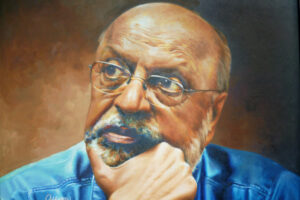A Visionary Who Reshaped Indian Industry
Many will remember Ratan Tata as an iconic Indian business leader, but his most enduring legacy will be his corporate philosophy and the human values that he promoted as a corporate captain
Almost everyone in the country, and beyond, mourned as the news of Ratan Naval Tata’s demise at the Breach Candy Hospital trickled in on the evening of October 9, 2024. It marked the end of an era. For millions, the
loss of Ratan Tata seemed a bit personal because in almost every Indian’s life, some Tata product or the other is part of their everyday routine. In his passing, Tata, 86, leaves behind a monumental legacy as he oversaw the transformation of one of the most diversified conglomerates from an old-economy behemoth into a nimble-footed giant that straddles both physical and virtual world business with
equal ease. For many, he was the benchmark of business acumen, corporate governance, social responsibility, and philanthropy. He helmed the Tata Group to truly becoming a global powerhouse. His acquisition of Jaguar Land Rover (JLR) not only saved an iconic
automobile brand but also steered its transformation into one of the most profitable operations in the Tata Group’s portfolio. Ratan Tata’s legacy is one of perseverance, innovation, and com
passion. He inherited the group of companies from the legendary Jehangir Ratanji Dadabhoy Tata and built it into a global empire that diversified far beyond its initial core businesses in steel, chemicals, and automobiles. Under his leadership, the Tata Group transformed from a predominantly India-focused business into a global entity with operations in over 100 countries totalling revenue in excess of $150 billion and employing more than a million people. In 1991, at the age of 54, Ratan Tata became chairman of the
Tata Group, facing resistance from influential senior leaders such as Russi Mody (Tata Steel), Ajit Kerkar (Indian Hotels), and Darbari Seth (Tata Chemicals and Tata Consumer Products), who wielded significant control over their individual companies. These leaders
often operated independently, sometimes in conflict with the group’s collective vision. To streamline the organisation and reinforce a unified leadership, Ratan Tata strategically implemented a
retirement policy, initially set at 70 years and later extended to 75. This policy allowed him to gradually phase out these powerful figures, consolidating his authority and driving a cohesive strategy for
the group. He later used similar measures to regain control of the Tata Group from Cyrus Mistry, reaffirming his leadership and vision for the conglomerate. Tata Steel, one of India’s oldest businesses, saw a critical turning point under Ratan Tata. In the early 1990s, following the era
of the legendary Russi Modi, Tata Steel needed modernisation to remain competitive in a rapidly liberalising India. Ratan Tata embraced this challenge, spearheading a series of reforms that
modernised its operations. His bold move to acquire Corus, the Anglo-Dutch steel giant, in 2007 for $12 billion, was one of his most ambitious ventures, turning Tata Steel into the fifth largest steel producer in the world. It was a defining moment that showcased his strategic acumen and willingness to take risks on a global scale. Tata Motors was perhaps the crown jewel of his legacy. What began as a leading manufacturer of commercial vehicles diversified into the passenger car segment under his guidance. He
launched Tata Sierra in 1991, then the first indigenously designed and developed Indian car, Indica, in 1998, an initiative that was
the global luxury car market. On top of that, the global financial crisis hit almost immediately after the acquisition, sending shock waves through the auto industry. When workers at JLR asked Tata
what he intended to do with the company, he didn’t have an immediate answer. But he knew he wanted to do something big. Faced with a mountain of challenges, including the need to
reposition JLR as a luxury brand, Ratan Tata’s approach was rooted
in his trademark patience and trust in the team that was already in place. Rather than imposing radical changes, he gave them the
space and confidence to innovate. No employee was fired. His faith paid off when JLR introduced a range of successful models, including the Range Rover Evoque and new Jaguar sedans, helping to
Under him, the Tata Group transformed from a predominantly India-focused business into a global entity withoperations in over 100 countries

both a source of national pride and a milestone in Indian automotive history. Tata Safari, Sumo and Indigo transformed the passenger segment; however, it was his vision of affordable mobility that
gained international attention with the launch of the Nano that was pitched as the world’s cheapest car. However, many years later,
he admitted that positioning the Nano as a cheap car backfired. But with the Nano project, Tata Motors demonstrated that it is possible to build low-cost cars. Many of the innovative processes that reduced the manufacturing cost of the Nano have now become industry standards. In 2008, Ratan Tata made one of the boldest moves of his career by acquiring the iconic British automotive brand, Jaguar Land
Rover, from Ford Motors. At the time, JLR was struggling with a limited product portfolio, quality issues, and stiff competition in
reinvent the brand’s image.
The turnaround was nothing short of dramatic. Despite the dire predictions and financial headwinds, under Tata’s stewardship JLR went from being a struggling asset to a significant revenue driver for Tata Motors — contributing around 70-75% of the company’s total automotive revenue. The acquisition, once viewed as a risky gamble, became one of the greatest success stories in Tata Motors’ history. JLR thrived, not only under Ratan Tata’s leadership
but because of his deep-rooted belief in the power of resilience, innovation, and long-term vision. Tata Motors is strengthening its leadership in the EV market,
commanding over 70% of the market share in India. The company will produce electric versions of the Range Rover and Range Rover Sport at its Chakan plant, with JLR’s first indigenously built EV set

His ability to steer businesses from traditional sectors into the new economy remains one of his most enduring achievements. While he consolidated Tata’s presence in industries like steel and
automobiles, he also made strategic exits from less profitable sectors. The Group expanded into retail with ventures like Croma and Tata Qliq, creating new spaces where Tata values of quality and service could shine. Ratan Tata had a sharp eye for the burgeoning tech and start-up ecosystem. His role as an angel investor in numerous start-ups in India’s new economy, such as Ola, Paytm, and Snapdeal, demonstrated his ability to foresee the next
wave of growth. His interest in nurturing young entrepreneurs reflected not just business acumen but also a deep belief in empowering future generations to innovate and lead. He invested in around 45 startups from diverse sectors, including Curefit,
Upstox, CarDekho, LensKart, Urban Company, FirstCry, among others. Ratan Tata, despite his traditional roots, had the foresight to embrace the evolving tech landscape, transitioning the Tata
Group from a traditional conglomerate into a diversified multinational conglomerate of the new era. A hallmark of Ratan Tata’s leadership was his commitment to ethics. He was known for saying, “Businesses need to go beyond
the interests of their companies to the communities they serve.”
These words shaped not only the Tata Group’s corporate strategy but also its broader role in society. Throughout his career, he stood as a beacon of integrity, maintaining the Tata reputation as one of
the most trusted companies globally. He believed in ‘work-life integration’ and ‘philanthropic duty’ rather than balance, ‘70 hours
Ratan Tata’s response to the 2008 terrorist attack on the Taj Mahal Palace Hotel in Mumbai, one of the Tata Group’s most iconic properties, remains etched in the nation’s memory. In the face of unimaginable tragedy, he led with compassion, personally overseeing efforts to rehabilitate the victims and ensure that the hotel rose again as a symbol of resilience. The way Tata treated its staff and their families after the attack was a testament to his enduring belief in the value of human life over profit. Ratan Tata, despite his immense stature, was never one to chase the limelight. His public relations approach was marked by humility, often letting his work speak for itself. While he was not the most flamboyant of leaders, his dignified demeanour
and unassuming style made him a beloved figure in India and respected worldwide. His dealings with the media were rare but impactful, each statement or action further solidifying his image as a man of quiet power and influence. In his later years, Tata became even more approachable for the younger generation, especially entrepreneurs, with whom he shared insights, stories, and encouragement, reaching out to inspire millions. Ratan Tata’s passing is a moment of reflection
for the Tata Group. His journey, from taking over a complex, sprawling conglomerate to steering it through some of its most
challenging times, will be remembered for generations. He didn’t just grow the company; he redefined Indian industry. He showed that business and ethics can, and should, go hand in hand. The world mourns the loss of Ratan Tata, but his legacy will endure — through the countless lives he touched, the businesses he shaped, and the future he envisioned for India and the world.




Add Comment